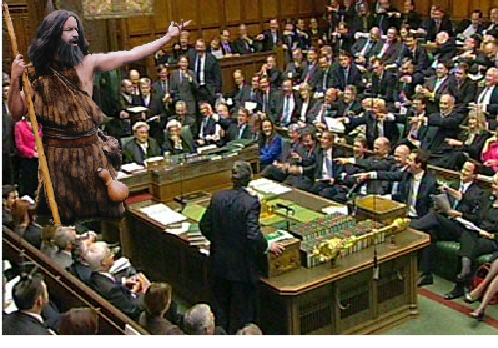 Related Articles
Related Articles
|
|
|
 Websites
Websites
|
|
|
|
|
Seduced by political power
As we move towards a General Election and the UK moves steadily further away from Christian values, are we seeing a move towards US-style politicised Christianity in Scotland?
by Watchman
 WITH the drift-cum-rush away from traditional values there has been an upsurge in interest within the evangelical Christian community regarding involvement in, and influence upon the political domain. WITH the drift-cum-rush away from traditional values there has been an upsurge in interest within the evangelical Christian community regarding involvement in, and influence upon the political domain.
And with the advent of the Scottish Parliament and proportional representation (potentially) offering a great deal of influence to minority parties, that interest has been heightened. We have now seen the emergence of the Scottish Christian Party.
The Scottish Parliament chose from its earliest days to declare a multi-faith position in having its ‘devotions’ led by representatives from the spectrum of faith groups. However, to maintain a strong Christian witness and prayer into the Scottish political scene, Parliamentary Prayers Scotland (PPS) was formed by followers of Jesus in Scotland. PPS functions as a ‘non-denominational Christian group that exists to pray for the needs of the Members of the Scottish Parliament.’
Elsewhere, in the halls of academia, an incident in 2007 showed Edinburgh University standing accused of ‘Christianphobia’ by banning Christian speakers while giving the Pagan Society permission to hold talks on witchcraft.
Politicised Christianity
In all of this what seems to be emerging is a trend towards a politicised ‘left/right’ divide emerging amongst Scottish evangelicals which seems to be mirroring that found on the other side of the Atlantic where the evangelical ‘right’ focuses on issues such as abortion, promiscuity and homosexuality whereas the cries from the ‘left’ relate to social action, ‘community transformation’ and environmental concerns. In America the latter is tending to produce a watered-down Gospel (cf Tony Campolo, Brian McLaren, et al) while strident voices on the extreme right rail against moral declension in a seemingly loveless manner. And at this end of the spectrum there is the ever-present shadows of Theonomy and Christian Reconstructionism hovering in the wings. These particular theologies, in earlier days, typically had church elders roaming the streets on a Sunday in search of those who were not in church and even today would desire to see nations ‘Christianised’ under an all-embracing religious and socio-political theocracy in a manner resembling that of Islam and Sharia law.
In truth there is no such thing as a ‘Christian nation’. (Israel was a chosen nation, but it was never wholly wedded to God as the biblical history shows; and no nation ever could be or will be.) Neither can there be anything able to call itself a truly ‘Christian party’ as such a title implies that there is a definitive Christian view on every aspect of modern life.
In 2008 the editor of the Free Church of Scotland’s magazine wrote an open letter to Alex Salmond as part of the latter’s ‘National Conversation on Scotland’s constitutional future’. In the piece David Robertson wrote: "We do not preach politics from our pulpits. "Anyone would struggle to find out what the Bible says about Scottish independence, the rate of income tax, wind farms on Lewis or golf courses in Aberdeenshire, because it says nothing. "We do not have a religious opinion on independence and there are a variety of views within our churches on the subject."
The ultimate manifesto
Of course it must be remembered that Jesus called his followers to be ‘salt and light’ and spoke strongly against failure in these areas of testimony and influence (Matt 5:13-15); . However he never gave any indication whatsoever that political activism was in the Divine plan. Indeed he emphasised that His mission was aimed at men (and women and children) rather than the prevailing political systems of His day and in the ages following His ascension. And of course the visions given to Daniel in Babylon (Dan 2:34,35) and John on island of Patmos (Rev. 14:8; 18:2ff) speak explicitly of the forthcoming demise of man’s (Satan’s) kingdom.
In this context, while believing that God will have his ‘placements’ in all spheres of life, including the compromised world of politics, the primary emphasis for any and every Christian – irrespective of where God has called him or her to be – is to ‘preach the Gospel, in season and out of season’ (2 Tim 4:2). Yet the clear and unadulterated message of Christ is anathema to a fallen world. And John the Baptist was amongst the most politically incorrect of his day. There are many pin-striped suits on green benches but very few are seen wearing hair shirts. They wouldn't get elected or in the door of course. But neither are those who are elected much able to speak. Whipping is as much a process of our day as that of Roman times.
Bu thank God for those believers called to the political fray. Pray for them: they need our prayers. They are operating in a swamp. But let us not for one moment believe that Christian political victories of even the greatest magnitude are going to have any lasting effect on a dying world. It is just not part of God’s plan.
|
Watchman, 27/02/2010
|
|
|
|